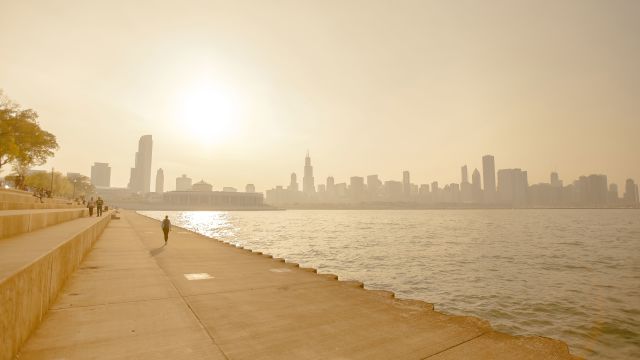Updated on June 29, 2023.
When a hurricane devastates a tropical island, a wildfire whips through a mountainside region, or a superstorm rocks an oceanfront city, most news channels default to blanket 24-hour coverage. But there’s one weather-related hazard that endangers more people and often gains less attention.
Surprising but true: In a typical year, summer heat kills more Americans than most other natural disasters combined.
An average of 700 Americans die every year of heat-related illness and as many as 9,235 are hospitalized, according to the Centers for Disease Control and Prevention. And when areas experience a serious heat wave, those death numbers can spike dramatically.
Scary, yes. But the good news is that heat-related deaths are in many cases preventable.
What you need to know about heat-related illness
Spending a few hot summer days on the beach isn’t going to do your body much harm. But when humidity, physical activity, and extended exposure are added to the mix, the chances of heat-related illness go up.
“The worst combination is a hot day with high humidity,” explains Albert Ahn, MD, clinical assistant professor in the department of medicine at NYU Grossman School of Medicine in New York City.
The body ordinarily sweats as a mechanism of cooling down. As sweat evaporates, it has a cooling effect on the body.
“But this doesn’t happen as effectively with high humidity,” Dr. Ahn notes. The consequence is that the body’s core temperature increases. This is why a midday run in the middle of July may leave you depleted, but a hot, humid July run may feel downright unbearable, leaving your clothes completely soaked and your body struggling to cool itself down.
On extra-steamy days, your body will give you some important warning signs if it’s adversely affected.
Ahn says the most common general heat-related illness symptoms include nausea, vomiting, lightheadedness, dizziness, muscle weakness, cramping, and blurry vision. In severe cases, some people may also feel disoriented and lose consciousness.
Understanding the categories of heat-related illness
Heat-related illnesses are typically understood as falling into three categories, from least severe to most serious:
Heat cramps
If you’re sweating excessively during exercise or feel muscle pain or spasms, you may be experiencing heat cramps. These can be alleviated by halting your workout, moving to a cool place, consuming fluids, and waiting for the cramps to subside.
Heat exhaustion
If you’re experiencing heat exhaustion, you may feel extremely sweaty, with muscle cramps, dizziness, a fast, weak pulse, and cold, clammy skin. In this case, you should move to a cooler location, drink water, and use cool, wet cloths—or ideally a cool bath, shower, or water spray—to help lower your body temperature.
Heat stroke
If you’re experiencing heat stroke—which means your body’s temperature has climbed to 103 degrees or higher—you may have a rapid pulse, headache, dizziness, nausea, and confusion. In very hot weather, sweating may actually stop, leaving your skin feeling hot and dry. In cases of heat stroke caused by working out in hot weather, your skin may feel slightly moist or dry. In any case, heat stroke requires immediate medical attention, and anyone suffering these symptoms should be cooled down as much as possible while waiting for help.
Extreme heat can be deadly
According to a 2017 analysis published in Circulation: Cardiovascular Quality and Outcomes, extreme heat is so dangerous that it can kill humans in 27 different ways, including via hyperthermia (abnormally high body temperature) that can lead to brain damage, respiratory failure, and heart, liver, or kidney failure.
If you’re experiencing signs of heat exhaustion that don’t improve within 20 to 30 minutes of rest and hydration, Ahn recommends seeking medical help.
And anyone showing symptoms of heat stroke should call 911 or go directly to the emergency room. “This is for the best,” Ahn notes, “as they can be quickly treated and resuscitated with IV fluids.”
During times of high heat and humidity, infants, children up to four years of age, and overweight people of all ages are at particular risk for serious heat-related illness.
People age 65 and older and people with chronic medical conditions are also at increased risk for death from heat exposure when exposed during prolonged periods of time without air conditioning.
“These patients have a more difficult time regulating their body temperature,” Ahn says. “They are also more likely to be socially isolated, which can make it harder for them to get help if they start to overheat.” Older adults are also more likely to suffer from chronic medical conditions that may affect how their bodies respond to heat.
People with kidney issues or heart conditions may be extra sensitive to excessive heat exposure, as are people taking certain medications. Diuretics, for example, can affect fluid states, which can make it hard for the body to stay properly hydrated.
Other medications—including certain antidepressants, stimulants for ADHD, drugs for Parkinson’s disease, allergy medications, and heart or blood pressure medications such as vasoconstrictors and beta-blockers—may affect the body’s ability to stay hydrated and regulate temperature.
How to prevent heat-related illness
A heat wave is commonly defined as several days of exceptionally high heat and humidity, but the parameters typically differ by region. In the Northeast, for example, temperatures above 90 degrees may be considered excessive, while in Florida that may be an average summer day.
The key to avoid getting sick is being prepared.
“Check the weather and heat index ahead of time, and avoid going out during times of extreme heat,” Ahn recommends. Follow the National Weather Service for updates on heat warnings in your area. “Staying well hydrated is obvious, but you should also remove yourself from the exposure by either going indoors or moving to a shaded area,” he says.
Here are Ahn’s tips for minimizing your risk of heat-related illness during periods of excessive heat and humidity:
Ease back on exercise
Consider skipping your outdoor workout, moving it indoors, or getting it done early in the day or late in the evening. Mid-heatwave is not the time to log that 20-mile midday training run before your next marathon.
“Decrease your physical activity,” says Ahn, “or you risk generating more body heat”—which ultimately can put you at risk for heat-related illness. If you absolutely must be outdoors regularly during very hot weather, give yourself several weeks to acclimate to the heat by spending limited amounts of time outdoors each day until your body is conditioned to it and be sure a healthcare provider approves of this plan.
Eat smart
Avoid large meals and foods that tend to leave you dehydrated, like those containing alcohol and caffeine.
Dress for the weather
Wear loose, breathable, light-colored clothing. “Dark clothes can make you feel hotter because they absorb more light,” Ahn says. “There’s no evidence to say dark clothes are an absolute no-no during heat,” but opting for lighter clothes won’t hurt. “More important,” he adds,” is the type of fabric you’re wearing. Make sure it’s a lightweight fabric that is able to breathe.” Avoid cotton and opt instead for sweat-wicking, technical fabrics such as those used in workout wear.
Don’t wait to hydrate
“You shouldn’t wait until you feel thirsty to start hydrating,” Ahn says. “By that point, you’re already behind.”
Active men usually require up to 15.5 cups of fluid per day on a hot day; women need roughly 11.5 cups. “If you’re exercising or sweating due to excessive heat, you’ll need more to keep up with your losses,” Ahn says. Never drink more than 48 ounces of water per hour though, as it could make the salt concentration in your body too low.
Sports drinks and rehydration formulas like Gatorade, Pedialyte, and coconut water can also be used to help replenish the electrolytes you lose when you perspire. Just avoid any energy drinks with caffeine. These types of beverages, along with the heat, can strain your heart.
Finally, don’t forget to stay connected to friends, family members, and neighbors during a heat wave. “If you live alone, contact a friend or family member,” Ahn says. Let them know you’re safe and cool or alert them if you need assistance.
Likewise, keep tabs on friends and loved ones who may be particularly vulnerable when a heat wave hits. Those include people who may not have air conditioning or whose homes make them difficult to access, such as those who live in apartment buildings without elevators.







